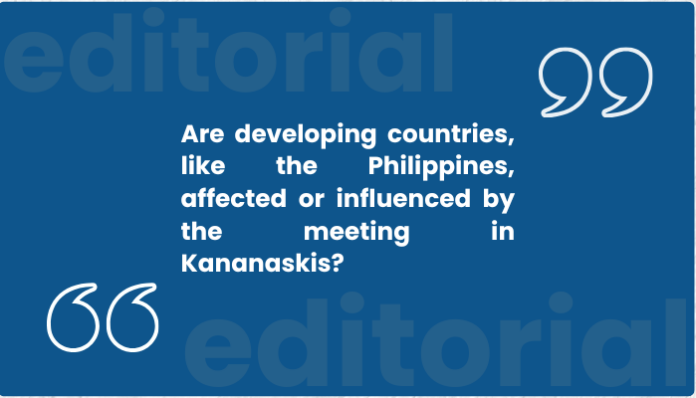THE eyes of the world are focused this week on the three-day G7 summit in the Canadian Rockies, where leaders of the informal group of democracies coordinate approaches to erratic global economic stability.
They are also scheduled to tackle, under intense discussions, threats to international peace and security – the likes of the protracted Ukraine-Russia war and the ongoing shocking Israeli campaign against Iran – and other transnational issues.
The question rises: Are developing countries, like the Philippines, affected or influenced by the meeting in Kananaskis?
The answer is yes. Low and middle-income nations are significantly impacted by the G7 summit, often indirectly, through discussions and decisions on global issues like climate change, lamentable trade, and development assistance.
Global economy observers say while the G7, founded in 50 years ago in 1975 when France hosted the first meeting, aims to address these issues, its focus and actions can have both positive and negative consequences for developing nations.
This is where developing countries will have their ears attentive as well, with leaders, beyond the table rhetoric on finding a common ground on the escalating conflict on Iran and Israel, not the least the long-drawn-out Ukraine war which has killed thousands on both sides and made millions refugees, gearing up for discussions on climate change, trade, development assistance and debt relief among others.
The G7’s commitments to climate action, including reducing emissions and providing climate finance, can have a significant impact on developing countries, particularly those most vulnerable to climate change impacts.
But the scale and speed of these commitments as well as the delivery of promised financial support, are crucial for developing countries to adapt to and mitigate the effects of climate change.
Some observers say G7 decisions on trade policies can affect developing countries’ access to markets, particularly for agricultural products and manufactured goods.
While the G7 may advocate for free trade, it’s important these policies are inclusive and benefit developing economies, ensuring fair competition and market access.
There are also development assistance and debt relief, close to the heartbeats of developing nations.
The G7’s commitment to development assistance and aid is vital for many developing countries. But changes in priorities or reductions in funding for aid programs can negatively impact these nations, particularly those heavily reliant on external support for essential services like healthcare and education.
At the same time, the G7’s discussions on debt sustainability and potential debt relief initiatives can be crucial for developing countries struggling with unsustainable debt burdens. However, the effectiveness of these initiatives depends on the specific terms and conditions of any debt relief provided.
We have our eyes and ears too on the Kananaskis summit.








